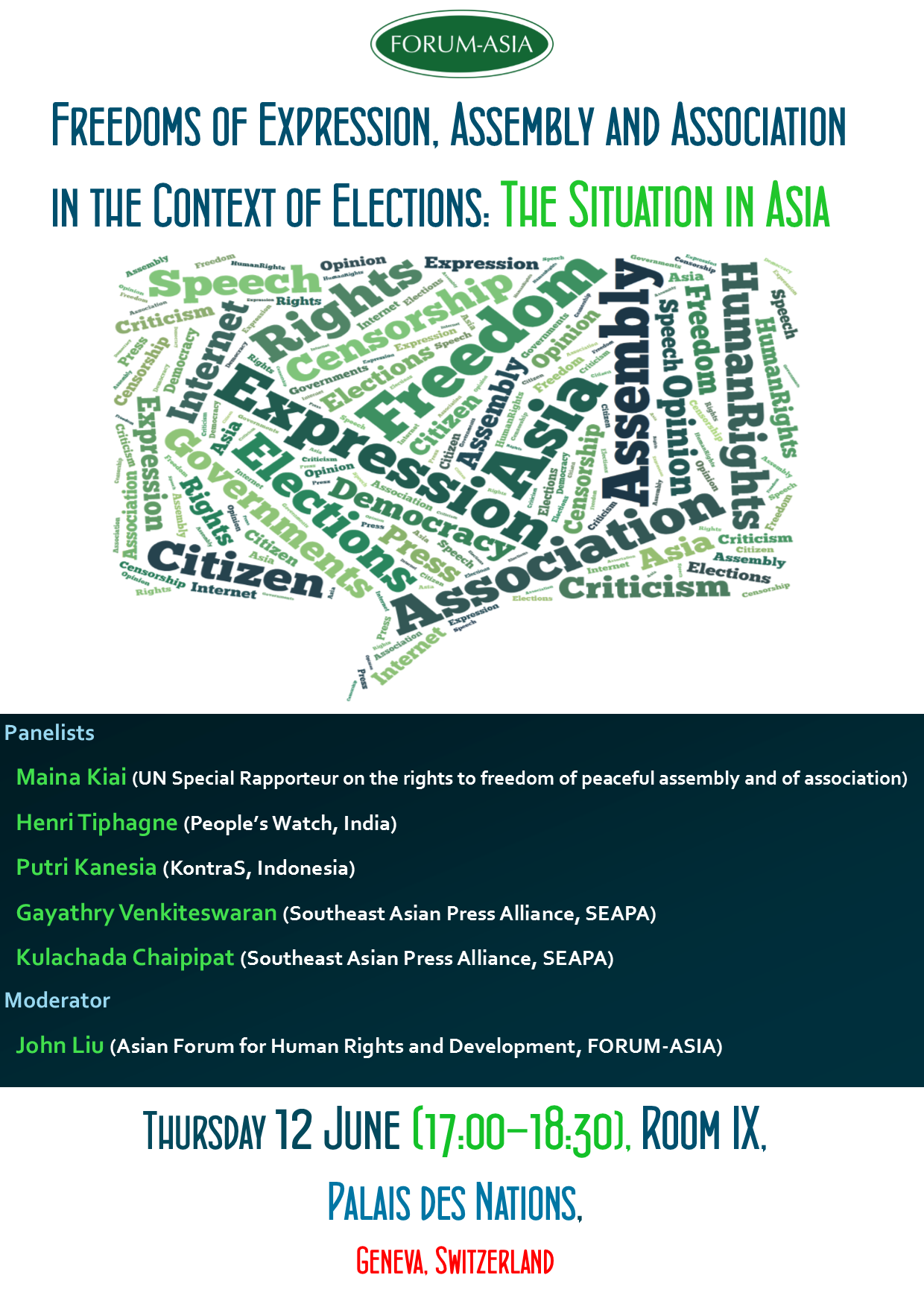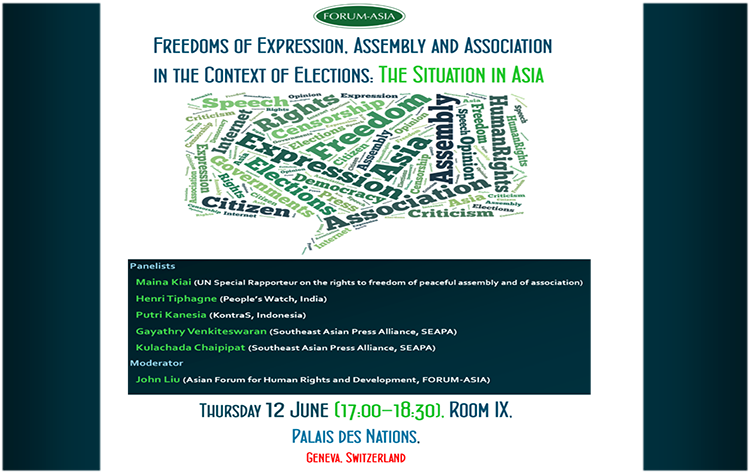
Freedoms of Expression, Assembly and Association in the Context of Elections:
The Situation in Asia
Organised by the Asian Forum for Human Rights and Development (FORUM-ASIA)
![]()
Introduction
This panel discussion aims to provide an assessment of the situation of freedoms of expression, assembly and association in Asian electoral contexts, based on several recently-held elections in the region: India, Indonesia, Malaysia, and Thailand. Some of the key issues that will be discussed include: crackdowns on election-related assemblies and speeches; the ownership and role of the media in elections; and attacks on journalists and human rights defenders in election contexts. The two recent reports on the topic of elections by the UN Special Rapporteurs on the promotion and protection of the right to freedom of opinion and expression (A/HRC/26/30) and on the rights to freedom of peaceful assembly and of association (A/68/299), as well as key existing and emerging international human rights standards in relation to elections will be used as parameters for discussion.
Background
In 2013, the UN Special Rapporteur on the rights to freedom of peaceful assembly and of association, Maina Kiai, presented his annual report to the UN General Assembly focusing specifically on the topic of the exercise of the rights to freedom of peaceful assembly and of association in the context of elections. The Special Rapporteur underlined the importance of examining election contexts within his mandate because “the rights to freedom of peaceful assembly and of association have increasingly come under attack as incumbent or incoming regimes seek to retain or gain power at all costs” and “the ability of individuals and associations to form and operate freely is particularly at risk during those periods” (A/68/299).
Meanwhile, on 10 June 2014, at the 26th Session of the UN Human Rights Council, the UN Special Rapporteur on the promotion and protection of the right to freedom of opinion and expression, Frank La Rue, will present his annual report on the topic of Political-Electoral Communications, with a particular focus on laws regulating political campaigning, advertising and polling; campaign spending and financing; and media coverage and independence; as well as violations of freedom of expression before, during and after electoral processes.
These two reports by the UN Special Rapporteurs clearly demonstrate the centrality of freedoms of expression, assembly and association in elections, and that major issues of concern relating to elections go beyond procedural aspects such as balloting. Indeed, human rights violations, including violations of freedoms of expression, assembly and association, are often amplified during election contexts. These reports by the UN experts draw upon a body of international human rights standards relating to elections that have emerged over the years, including:
- Articles 20 and 21 of the 1948 Universal Declaration of Human Rights;
- Articles 19, 21, 22 and 25 of the 1966 International Covenant on Civil and Political Rights (ICCPR);
- Article 7 of the 1979 Convention on the Elimination of All Forms of Discrimination Against Women (CEDAW);
- UN General Assembly Resolution (A/Res/46/137) on enhancing the effectiveness of the principle of periodic and genuine elections; and
- UN Human Rights Committee’s General Comments Nos. 25 and 34, which provide further elaboration respectively on the right to participate in public affairs and the right to freedom of opinion and expression, including on public and political issues
Objectives
- To share Asian civil society assessments and perspectives on the situation of freedoms of expression, assembly and association, based on recent experiences of elections;
- Based on recommendations in the recent reports by the UN Special Rapporteurs on freedom of expression and on freedoms of assembly and association and other existing international human rights standards:
- Draw out key recommendations and identify gaps in these reports based on Asian civil society assessment of elections in the region;
- Identify opportunities and ways to follow-up on recommendations with a view of advocating for their implementation in future elections in Asia.
Panel discussion
Speakers:
- Maina Kiai (UN Special Rapporteur on the rights to freedom of peaceful assembly and of association)
- Henri Tiphagne (People’s Watch, India)
- Putri Kanesia (KontraS, Indonesia)
- Gayathry Venkiteswaran (Southeast Asian Press Alliance, SEAPA)
- Kulachada Chaipipat (Southeast Asian Press Alliance, SEAPA)
Moderator:
- John Liu (Asian Forum for Human Rights and Development, FORUM-ASIA)
Panel format
The UN Special Rapporteur on the rights to freedom of peaceful assembly and of association will open the discussion with a brief summary of his report on freedoms of assembly and association in the context of elections. This will be followed by brief presentations by the four civil society panelists from Asia providing a general overview of the main challenges and violations of freedoms of expression, assembly and association in the context of elections in their respective countries. The UN Special Rapporteur will then provide responses to the panelists’ assessments of their respective country situations, followed by a round of questions posed by the moderator to each panelist.There will be an open question and answer session, before a final round remarks from each panelist.



